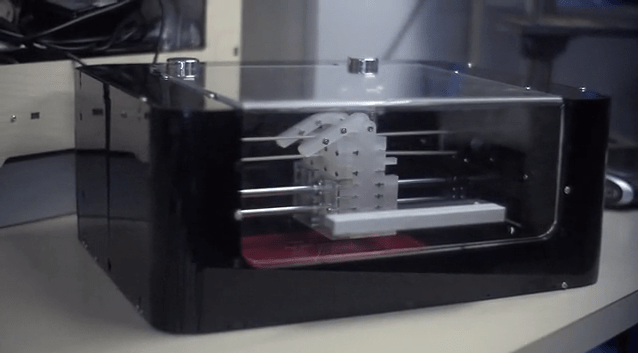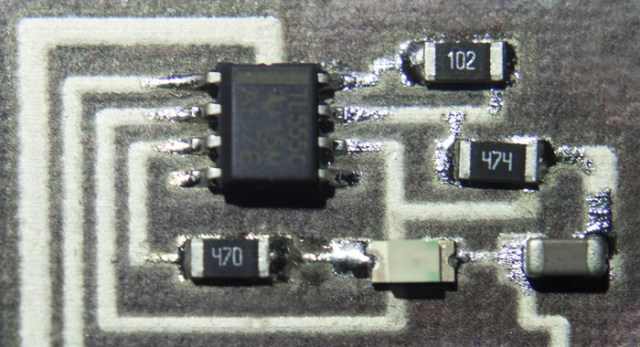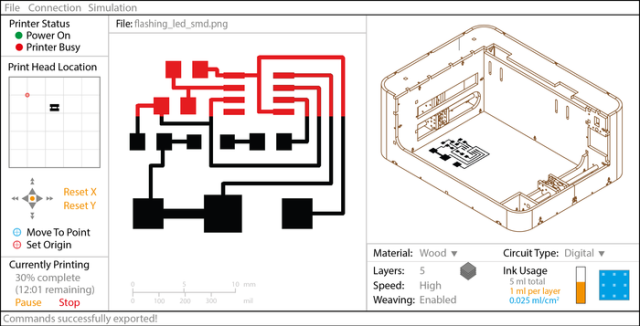3D printers are great if you want to print small plastic widgets. But what if you want to print something a bit smarter, like an electronic circuit board? Australia and U.S.-based startup Cartesian Co. wants to extend the principle of affordable 3D printing to PCBs — and they’ve taken to Kickstarter to raise $30,000 to get their printer prototype, called The Ex1, to market.
They’re not claiming to have come up with the first ever circuit board printer. But they do claim to be first to have squeezed the price of the tech to maker-friendly levels. “This is the first ever circuit board printer available to hobbyists,” the startup tells TechCrunch. “It uses an inkjet additive technique not previously available for under $50,000.”
The Ex1 is available to a (tiny) handful of early bird Kickstarter backers for $899, rising to $1,199 and then $1,499. After all those limited offer pledges have been bagged the price-tag floor will be $1,999. Still a damn sight cheaper than $50,000.
The Ex1 offers a step up from breadboards, in terms of being more flexible about what you build a circuit on. As for etching your own PCB — that can be cheap but is also a pretty fiddly process. So the Ex1 is intending to improve the convenience of electronic prototyping, while also keeping the cost to a relatively affordable level (vs pro printers at least). It’s priced at a level for schools and workshops to get more kids and makers tinkering with electronics.
“We see this doing to electronics what 3D printers have done to mechanical prototyping. 3D printers had been around for decades before they became popular, but only became cheap enough for everyone to have in the last couple of years. This explosion in the access to cutting edge technology is what has driven us to create a completely new breed of printers,” it adds.
The Ex1 layers silver nano particles onto paper — or any suitable surface — via an inkjet printing process to rapidly create a circuit board. It actually lays down two chemicals separately, one on top of the other. The two then react to form the conductive silver traces.
The startup has been experimenting with printing circuits on a variety of substrates — including paper, plastics, stickers, fabrics, silicone and even materials such as wood, glass and ceramic. It is also developing coatings to “allow virtually any surface to be printed on”.
What about adding components to the printed PCBs to create fully fledged electronics? The startup says components can be soldiered onto its printed circuits or added using conductive glue — with the idea being to keep the whole process simple, allowing for owners of the printers to build stuff even if they don’t own a soldering iron.
The startup is also aiming to keep things simple on the PCB design side — its software will allow images to be imported and printed, and includes presets and tools to help lower the barrier to entry.
“The average user doesn’t need to be a CAD master, they can just go online and download one of a million designs that someone else has already made for their purpose. Our printer is just as easy as this, letting anyone make things they could have never even imagined before. The infrastructure for this already exists, and we look forward to working with a large and motivated community to make it even easier,” it says.
“We want everyone to be able to enjoy the future of making things. That’s why we’re making it easy for hackerspaces and schools to get and use our printers. Imagine a classroom, where the kids aren’t just learning about electronics, but making electronics!”
How has Cartesian Co. got this far? It’s come out of iLab, a Brisbane-based incubator, whose program includes initial equity, office space, and mentoring.


